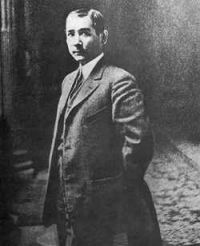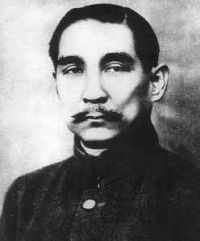Sun Yat-sen
Sun Yat-sen (孙中山) is a Chinese democratic revolution forerunner and first president of the Republic of China.
Born to a poor family in Xiangshan County, Guangdong Province on November 12, 1866, he graduated as a medical doctor from the Hong Kong College of Medicine for Chinese, the forerunner of the University of Hong Kong, in 1892 and worked in Macao. In 1894, Sun wrote a long letter to Li Hongzhang, the governor-general of the Qing Dynasty and a reformer in the court, with suggestions on how to strengthen China but was rebuffed, so he went instead to Honolulu. There, he founded the Xingzhonghui, or the "Revive China Society," a revolutionary organization. However, his Guangzhou revolt in 1895 failed due to an information leak, and he was exiled. During his stay in Europe, Sun immersed himself in western politics and economics and came into contact with socialism theory. He began to advocate that "only revolution can save China." He went to Japan in 1897 and founded the Tongmenghui, also known as the "Chinese United League" or the "Chinese Revolutionary Alliance," based on several anti-Qing government groups, such as the Huaxinghui and Guangfuhui. Sun was elected as premier. He raised revolution guiding principles such as "expel the Qing government, restore Chinese Han people's leadership, establish a democratic nation and equalize land ownership." Then, he developed the "Three People's Principles," which embodied the values of nationalism, democracy and the people's livelihood.
After a military uprising succeeded in Wuchang on Oct. 10, 1911, Sun went back to Shanghai and was elected provisional president. He was inaugurated as the president of the Provisional Government of Republic of China in Nanking in January 1912 and issued the Provisional Constitution of the Republic of China, the first of its kind in China. Under pressure from capitalism and feudal powers, he resigned his presidency on Feb. 13 and Yuan Shikai, the man in charge of the Beiyang Army, the military of northern China, succeeded him. The Tongmenghui was restructured into the Kuomintang and Sun was elected as director-general on Aug. 25. However, in March 1913, Yuan Shikai assassinated Song Jiaoren, a major leader of the Kuomintang. In the same year, Sun led an unsuccessful revolt against Yuan, ultimately forcing him to seek asylum in Japan, where he reorganized the Kuomintang.
Sun returned to China in 1917 to advocate unification. He started a self-proclaimed military government in Guangzhou, Guangdong Province, in 1921, and was elected as president and generalissimo. The Chinese Revolution Party was then reshuffled into the Kuomintang.
In 1923, Sun proclaimed the three policies of "unite Russia, the Communist Party and support farmers and workers." The first national congress of the Kuomintang was held in Guangzhou in January 1924. He developed the new Three People's Principles and realized the first Kuomintang-Communist Cooperation. He established the Huangpu Military Academy in June. Sun traveled north in November of that year and delivered a speech to suggest the gathering of a conference for the Chinese people and the abolition of all unequal treaties with the Western powers. He arrived in Beijing at the end of 1924 and kept on fighting with the northern warlords. Sun died of liver cancer on March 12, 1925, at the age of 58 in Beijing.

